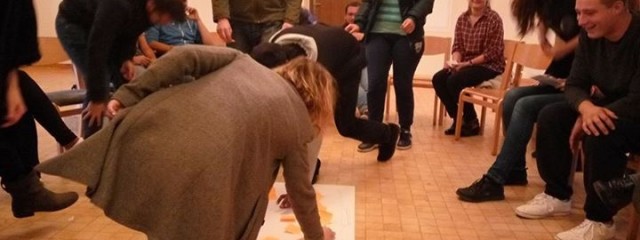Erasmus+ training Course „EU-Line –ICT in youth work” took a place in Krzyzowa, Poland. It was hosted by Central European Trainers Platform and implemented in corporation: Green Spirit, Evropa v dvijenie, Civilna, edukativna i transparentna platforma, EUROSUD, Asociatia pentru Promovarea Egalitatii intre Tineri – ADAPTO, ProjectRevoliution, YOUTH, Asociacija Apkabink Europą, Jurmalas pilsetas Kauguru vidusskola, Asociace DICE, Central European Trainers’ Platform. The participation was supported by Innovation Office (Inovacijų biuras).
It was 8 days-training (from 8th to 15th of October 2016) for a youth workers from 10 different European countries (Croatia, Romania, Italy, Lithuania, Bulgaria, United Kingdom, Latvia, Greece, Czech Republic and Poland). The main idea was to provide knowledge of to implement ICT tools and online-resources in fighting youth unemployment in Europe by using non-formal education methods. The project was the first of the series of activities under common name of “EU-Line” promoting ICT in youth work.
Participants had three trainers (Bojan Kocevski, Michal Marcinkiewicz, Voja Vujić) who were providing knowledge about ICT tools and involved them in an seminar activities, which generally improved not only teamwork as participants needed to change the groups every day or even twice a day, but also they met with the other participants form other countries and had a chance to get to know their countries political, cultural, economic and sociological portfolio and in the end were able to compare these facts with their own national situation, probably to learn form others or to suggest some solutions, especially for those who works in non-governmental organizations.
In training participants learned how to use ICT in youth work and how we can provide a support for youth in job seeking and developing their competence online (working with EURES, LinkedIn, Europass, creating a motivation letter and improvised job interviews and etc.). Other part of training was about the relevance of youth unemployment in Europe, here participants learned about situation in Europe, analysed and structured the problems of youth unemployment, searched for a ways to deal with this issue by using youth NGOs in the respective countries which spread information about the measures to find a job for a unemployed youth. Also by using their own created video clips, participants presented the availability of getting fundings from the European Union to other: projects, new companies, start-ups, organizations and so on.
Non-formal education during these trainings was covered by: team-building, ice-breakers, brainstorming, group work, presentations, debates, discussions, role plays, simulations, IT workshops, recording videos and other multimedia materials.
In the end, participants should be able to use ICT in implementation of projects and activities related to the topics of youth employability, researching wider target groups, improvement of situation of youth at the labour market, strengthening partnerships and collaborations, good practice exchange, future project planning.


